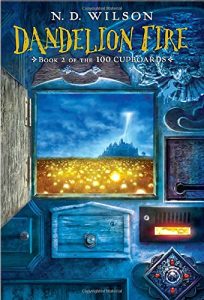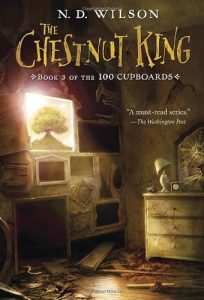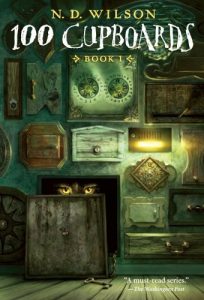Henry discovers 100 cupboards that lead to other worlds in this complex middle grades fantasy series that mirrors the creation-fall-redemption narrative framework of Scripture.
 100 Cupboards (100 Cupboards, Book 1) by N. D. Wilson. Yearling, 2008 (paperback). 320 pages.
100 Cupboards (100 Cupboards, Book 1) by N. D. Wilson. Yearling, 2008 (paperback). 320 pages.- Dandelion Fire (100 Cupboards, Book 2) by N. D. Wilson. Yearling, 2009. 480 pages.
- The Chestnut King (100 Cupboards, Book 3) by N. D. Wilson. Yearling, 2011. 512 pages.
Reading Level: Middle grades, ages 10-12
Recommended For: Ages 10 and up (and adventurous 9 year olds) who love complex fantasy; for fantasy-loving families, this works well as a read aloud for ages 10 and up
In this first book of the trilogy, we meet Henry York, nephew to Frank Willis and his cheery wife, Dottie, and cousin to Henrietta, Penelope, and Anastasia. Henry is living with them for the summer, and they happen to live, ironically enough, in Henry, Kansas (Henry is from back East). During the summer, Henry learns to play baseball. He also learns that there are 99 hidden cupboard doors in his attic room, how to get into the formerly locked and impenetrable door to his deceased grandfather’s room, and how to travel to new worlds. And then Henry and his cousin let loose a witch from another world. And Henry discovers that he himself might be from another world….

In book two of the 100 Cupboards Trilogy, Henry, KS, forms a distant memory as Henry, Henrietta, and the rest of their family embark on otherworldly adventures. Only one of these persons actually seeks out his or her adventure. The rest have their “greatness thrust upon them” as it were.
In book 3, well, Wilson knows how to end a series with a bang. Seriously.
The 100 Cupboards Series is finely crafted with imaginative new worlds, complex plotting, and terrific character development. Wilson depicts loving–yet realistic–families complete with sibling/cousin bickering and married couples who orbit around each other without seeming cheesy. Yet Wilson also portrays the grand narrative thread of Scripture itself: creation (Henry, KS, at the beginning), a terrific fall (the release of the witch Nimiane* at the unwitting hand of Henry is a remarkable parallel to Adam’s original sin, isn’t it, in which sin entered our world and corrupted it fully and utterly), and the hope of redemption–that there will be a way to fix this mess with Nimiane, but it will involve sacrifice. If 100 Cupboards starts the narrative thread in motion with Creation and the Fall, Dandelion Fire shows the scope of the fall. Here we see evil, and the death it creates as it spreads its tentacles. And here we see the beginnings of redemption: Heroes rise up. People stand in the gap. And brothers come together, families are reunited, and hope springs anew. All because of a little dandelion.

One of the reasons fantasy can be so enjoyable is that it helps us picture the reality lurking outside our temporal, earth-bound viewpoints. The Story of the Bible is grand, over-arching, and firmly grounded in a spiritual reality that the earth merely participates in. Battles are being waged that we can’t see. Truly wicked forces are at work–and the heroes that rise up to fight for the side of good aren’t always the strong, beautiful, or brave folks. But they are fighting for what they believe in because they have been called to do so.
This is what The Chestnut King, book 3, communicates so well: epic battle, incredibly wicked foes, ordinary heroes, sacrifice, reunion–just what the final book in an epic fantasy trilogy should be. This is also how Revelation depicts some of the final story of the Bible as Christ returns and the bride of Christ is united with him.
*”Nimiane” sounds similar to Hermione: Ni-MYE-ah-nee
Things to Note/Discuss
- Ask your students/children if they see elements of the creation-fall-redemption framework in this series (or even just book 1). This particular book (and the series) is a wonderful introduction to that idea because the elements are so clear.
- Are Henry and Henrietta being wise in Book 1? Are they obeying? Do they make good decisions? Do either of them annoy you at all?
- The heroic tradition: what makes an epic hero? (think of the unlikely hero and the quest and all those famous stories you know!)
- The “Green Man” is a legend/tradition in its own right (Dandelion Fire). Feel free to do a little outside research!
- Also, there is a big difference in literary tradition between fairies, faeren, and the fae. You might be surprised to know that all are not like the Disney Tinkerbell. In fact, Tinkerbell is a rather modern creation….
Cautions: Violence (the evil villains are truly evil), Supernatural (the witch mentioned in the review), Mild Language (book 2)
Overall Rating: 5
Worldview Rating: 5
Artistic Rating: 4.75
We’ve favorably reviewed several of N. D. Wilson’s books for kids here on Redeemed Reader: Ashtown Burials Series (Book 1, Book 2, Book 3) and Boys of Blur. For fantasy works by other Christian authors, check out Jonathan Rogers, Andrew Peterson, and Andrew Klavan as a good start!
Stay Up to Date!
Get the information you need to make wise choices about books for your children and teens.
Our weekly newsletter includes our latest reviews, related links from around the web, a featured book list, book trivia, and more. We never sell your information. You may unsubscribe at any time.
Support our writers and help keep Redeemed Reader ad-free by joining the Redeemed Reader Fellowship.
Stay Up to Date!
Get the information you need to make wise choices about books for your children and teens.
Our weekly newsletter includes our latest reviews, related links from around the web, a featured book list, book trivia, and more. We never sell your information. You may unsubscribe at any time.
We'd love to hear from you!
Our comments are now limited to our members (both Silver and Golden Key). Members, you just need to log in with your normal log-in credentials!
Not a member yet? You can join the Silver Key ($2.99/month) for a free 2-week trial. Cancel at any time. Find out more about membership here.
3 Comments
Leave a Comment
You must be logged in to post a comment.

 100 Cupboards (100 Cupboards, Book 1) by N. D. Wilson. Yearling, 2008 (paperback). 320 pages.
100 Cupboards (100 Cupboards, Book 1) by N. D. Wilson. Yearling, 2008 (paperback). 320 pages.
I read the 100 Cupboards and was alarmed at the witch drinking blood. I would like to see some discussion of that scene and how it fits into the larger scheme of being instructional/uplifting to Christians.
Thanks for your comment, Sally. You’re absolutely right: Nimiane (the witch) IS alarming. The witch is most definitely evil; Wilson can craft a really good villain and he adds just enough detail to be almost disturbing. Wilson would be the first to admit his stories can be dark and scary, but he also does this on purpose.
As Christians we have the Old Testament full of scary images. Child sacrifice, the priests of Baal flaying themselves, dogs lapping up the blood of Jezebel. (Not to mention when someone from the good side leaves his concubine to the mercies of the Benjaminites and then hacks her into pieces. And we won’t even go into the sinfulness of Judah’s sons.)
The Bible isn’t tidy. It graphically captures the reality and ugliness of sin. This is something we appreciate about Wilson; he has an Old Testament type violence. He captures the reality and wickedness of sin, and there’s no sneaking doubt that the witch might just be misunderstood, or had a bad childhood. Rather, she is evil. She drinks blood. We don’t want to be like her. We should have nothing to do with her kind. And, perhaps even more importantly, there is no doubt that defeating her is the right thing to do even though it will demand sacrifice. Wilson always has true heroes rise up and conquer those villains, and those heroes often make terrific sacrifices. In this way, he’s helping readers appreciate that triumphing over the very real evil in our world takes (and took!) tremendous sacrifice; the evil was/is great enough that God had to send his own Son to die.
Wilson’s stories aren’t for young, sensitive readers, but when placed against the backdrop of our mutual faith, we believe they can be enjoyed and profitable.
[…] One of our biggest requests are books for boys, and we’ve reviewed a lot: Andrew Klavan and ND Wilson write great action-packed fantasy. Books like Tiger Boy, Sputnik’s Guide to Life on Earth, and […]